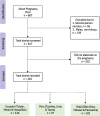Experiences of pregnant Venezuelan migrants/refugees in Brazil, Ecuador and Peru: a qualitative analysis
- PMID: 38395816
- PMCID: PMC10885441
- DOI: 10.1186/s12884-024-06334-0
Experiences of pregnant Venezuelan migrants/refugees in Brazil, Ecuador and Peru: a qualitative analysis
Abstract
Background: It is estimated that since 2014, approximately 7.3 million Venezuelan migrants/refugees have left the country. Although both male and female migrants/refugees are vulnerable, female migrants/refugees are more likely to face discrimination, emotional, physical, and sexual violence. Currently there is a lack of literature that explores the experiences of pregnant Venezuelan migrants/refugees. Our aim is to better understand the experience of this vulnerable population to inform programming.
Methods: In the parent study, Spryng.io's sensemaking tool was used to gain insight into the gendered migration experiences of Venezuelan women/girls. A total of 9339 micronarratives were collected from 9116 unique participants in Peru, Ecuador and Brazil from January to April 2022. For the purpose of this analysis, two independent reviewers screened 817 micronarratives which were identified by the participant as being about someone who was pregnant, ultimately including 231 as part of the thematic analysis. This was an exploratory study and an open thematic analysis of the narratives was performed.
Results: The mean age and standard deviation of our population was 25.77 ± 6.73. The majority of women in the sample already had at least 1 child (62%), were married at the time of migration (53%) and identified as low socio-economic status (59%). The qualitative analysis revealed the following main themes among pregnant Venezuelan migrants/refugees: xenophobia in the forms of racial slurs and hostile treatment from health-care workers while accessing pregnancy care; sexual, physical, and verbal violence experienced during migration; lack of shelter, resources and financial support; and travelling with the hopes of a better future.
Conclusion: Pregnant Venezuelan migrants/refugees are a vulnerable population that encounter complex gender-based and societal issues that are rarely sufficiently reported. The findings of this study can inform governments, non-governmental organizations, and international organizations to improve support systems for pregnant migrants/refugees. Based on the results of our study we recommend addressing xenophobia in health-care centres and the lack of shelter and food in host countries at various levels, creating support spaces for pregnant women who experience trauma or violence, and connecting women with reliable employment opportunities and maternal healthcare.
Keywords: Global health; Migration; Pregnancy; South America.
© 2024. The Author(s).
Conflict of interest statement
The authors declare no competing interests.
Figures
Similar articles
-
Comparing migration experiences of Venezuelan women and girls: a mixed-method, cross-sectional analysis of refugees/migrants in Ecuador, Peru and Brazil.BMJ Public Health. 2023 Oct 18;1(1):e000027. doi: 10.1136/bmjph-2023-000027. eCollection 2023 Nov. BMJ Public Health. 2023. PMID: 40017841 Free PMC article.
-
Narratives of experiences of violence of Venezuelan migrant women sheltered at the northwestern Brazilian border.PLoS One. 2021 Nov 19;16(11):e0260300. doi: 10.1371/journal.pone.0260300. eCollection 2021. PLoS One. 2021. PMID: 34797877 Free PMC article.
-
Access to HIV/STI testing among male and female Venezuelan migrants in Peru: evidence from a nationwide survey.BMC Public Health. 2024 Jan 17;24(1):210. doi: 10.1186/s12889-024-17655-2. BMC Public Health. 2024. PMID: 38233806 Free PMC article.
-
A Scoping Review of Non-Communicable Diseases and Maternal and Child Health Needs of Venezuelan Migrants in South America.J Glob Health Rep. 2021;5:e2021045. doi: 10.29392/001c.23621. Epub 2021 May 15. J Glob Health Rep. 2021. PMID: 34113721 Free PMC article.
-
Maternal health among Venezuelan women migrants at the border of Brazil.BMC Public Health. 2020 Nov 23;20(1):1771. doi: 10.1186/s12889-020-09912-x. BMC Public Health. 2020. PMID: 33228642 Free PMC article. Review.
Cited by
-
Extortion experiences of recent adult immigrants from Latin America: self-reported prevalence, associated costs, and current mental health.Inj Epidemiol. 2024 Sep 5;11(1):43. doi: 10.1186/s40621-024-00524-2. Inj Epidemiol. 2024. PMID: 39238066 Free PMC article.
-
Using Respondent-Driven Sampling (RDS) to Identify the Healthcare Needs among Women of Reproductive Age Who Migrated from Venezuela to Brazil, 2018-2021.Int J Environ Res Public Health. 2024 Jun 20;21(6):811. doi: 10.3390/ijerph21060811. Int J Environ Res Public Health. 2024. PMID: 38929057 Free PMC article.
-
"I am a young Venezuelan woman who left her country": exploring the drivers of Venezuelan migration and how the migration experience impacts adolescent girls' aspirations.BMC Public Health. 2025 Jul 8;25(1):2410. doi: 10.1186/s12889-025-22019-5. BMC Public Health. 2025. PMID: 40629366 Free PMC article.
References
-
- Gamlen A. Migration and mobility after the 2020 pandemic: The end of an age? Geneva: International Organization for Migration (IOM); 2020.
-
- IOM UN Migration. “Venezuela Refugee and Migrant Crisis.” Accessed 5 May 2023. https://www.iom.int/venezuelan-refugee-and-migrant-crisis
-
- R4V - Refugees and Migrants from Venezuela. (n.d). Retrieved 22 Mar 2023 from: https://www.r4v.info/en/refugeeandmigrants
-
- John M. Venezuelan economic crisis: crossing Latin American and Caribbean borders. Migration and Development. 2019;8(3):437–447. doi: 10.1080/21632324.2018.1502003. - DOI
-
- Spiridigliozzi C, Barbeito F. Stuck In The Middle: The Case of Venezuelan Migrants. Forced Migration and Modern Slavery: Unplanned Journeys of Exploitation and Survival. 2023;8(1):79.
MeSH terms
Grants and funding
LinkOut - more resources
Full Text Sources
Miscellaneous


